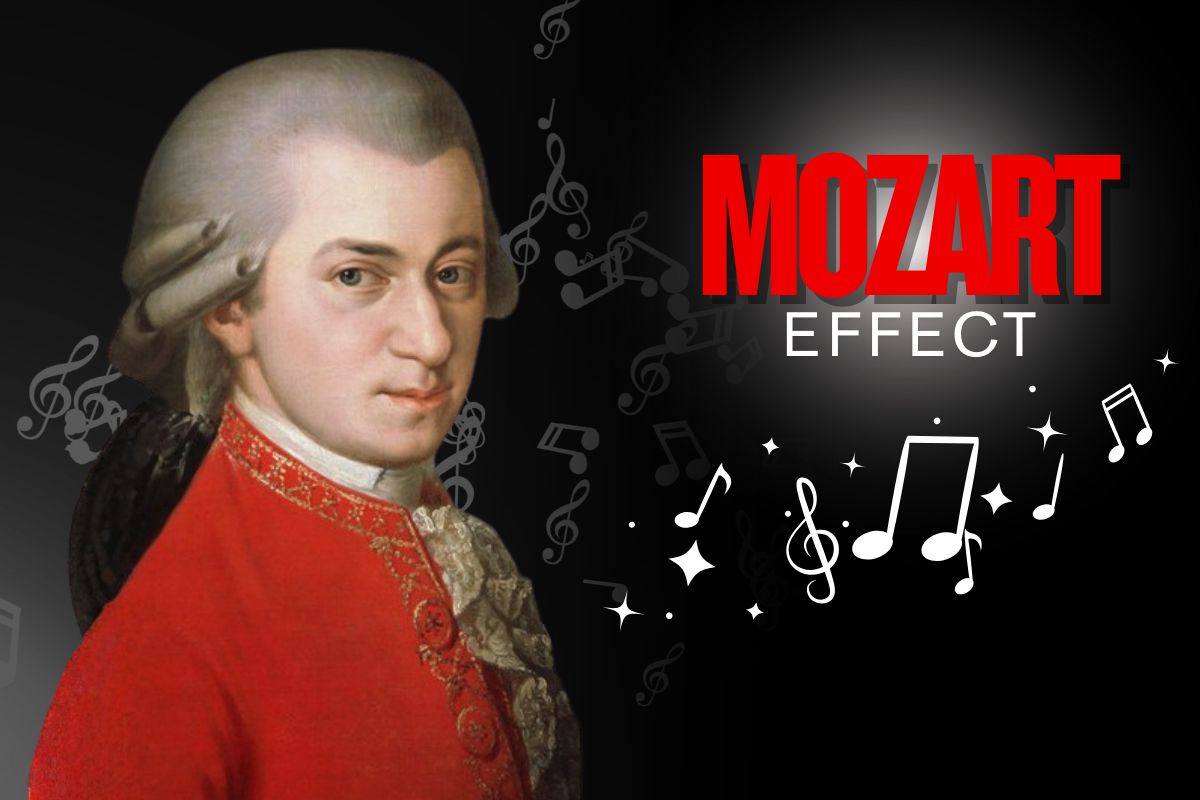Mozart Effect: Myth or Reality? Does Mozart Make You Smarter?

The Mozart Effect is a debated idea. It suggests that listening to Mozart can boost intelligence, especially in spatial skills, for a short time. Some evidence shows slight benefits, but professionals mostly see the effect as short-lived and not unique to Mozart. So, it’s more of a myth than a lasting truth.
What is the Mozart Effect?
The Mozart Effect is named after a 1993 study by Rauscher, Shaw, and Ky. They claimed that listening to Mozart’s Sonata for Two Pianos in D Major boosts college students’ spatial reasoning skills. Students who listened to Mozart scored higher on tests like paper folding and maze-solving. This was better than those who stayed quiet or listened to relaxation tapes.
This finding sparked a media frenzy. It led many to believe that Mozart’s music is intellectually enriching. The hypothesis appealed to parents and educators. Some U.S. states even started giving classical music CDs as gifts for newborns to boost intelligence.
Scientific Criticism and Replication Efforts
Early excitement existed, but later research questioned the lasting impact of the Mozart Effect. Multiple replication experiments failed or discovered modest improvements. Critics argue that:
- The first study used a small sample (36 college students).
- The cognitive boost lasted only about 10–15 minutes. This points to a fleeting arousal effect, not a lasting change in intelligence.
- Similar effects were found for other types of music, and the impression that the effect is even perhaps not due to Mozart is a feature of some studies.
A 2010 meta-analysis found that music can boost feelings and arousal. However, it’s the improvements in mood and arousal—not the music itself—that may lead to better cognitive performance.
Is It Just Mozart?
Perhaps the most common of the myths is that the effect is due to Mozart alone. Actually, experiments have shown that:
- Listening to another musician like Beethoven or even upbeat pop music can have the same effect.
- The key is listener engagement and emotional response, rather than the composer.
This raises the potential that the Mozart Effect is more a matter of how music influences mood and attentiveness than any particular cognitive facility inherent in Mozart’s music.
Impact on Children and Education
The Mozart Effect has been most influential in early childhood education. Mothers typically play classical music for babies as a way to supposedly improve brain development. Scientific research shows:
- No conclusive evidence that listening passively to Mozart improves long-term cognitive abilities in children.
- Active music study, such as learning an instrument, has a stronger and more lasting influence on brain development and school performance.
So, good exposure to music, but it’s active listening—not passive listening—that is most beneficial.
Psychological and Neurological Insights
From a neuroscientific perspective, music does affect the brain:
- It activates parts of the brain that are linked with emotion, memory, and attention.
- It can alleviate anxiety and improve mood, which secondarily improves cognitive function.
- Complicated music, such as Mozart’s, can activate the brain more than simpler works.
However, these effects are not specifically Mozart’s and vary significantly between individuals depending on personal preferences and cultural orientation.
Commercialization and Misinterpretation
Commercialization took place, and businesses began to sell CDs and software promising mental enhancement. Commercialization tended to exaggerate the scientific findings, which led to:
- Misinterpretation of the research.
- Overuse of passive listening as a teaching tool.
- Overlooks more efficient learning methods, such as interactive learning and exercise.
Experts caution against holding out music as a magic solution to intelligence and emphasize the need for holistic approaches to cognitive development.
What Music Can Actually Do
Although the Mozart Effect may be exaggerated, music still has real benefits:
- Lifts mood and depression.
- Enhances concentration and productivity, especially in repetitive activities.
- Facilitates memory recall, particularly in Alzheimer’s or dementia patients.
- Encourages creativity and emotional expression.
These consequences are best realized when music is performed with purpose and programmed to particular requirements.
Conclusion
The Mozart Effect, as most generally conceived, is nearly a myth. Mozart will not make you smarter in any lasting way. Music—especially difficult and affectively engaging music—can, however, transiently enhance mental function through increased mood and alertness.
Instead of passive listening, people might try:
- Active musical participation, e.g., playing an instrument.
- Using music intentionally, for example, when studying or unwinding.
- Trying out different genres to see what suits their state of mind.
At the end of the day, music is a strong tool—not to boost IQ, but to enrich the human experience.
Frequently Asked Questions (FAQ)
Q: Does listening to Mozart boost IQ?
A: No. The initial study showed a temporary gain in spatial thinking, not a permanent upgrade in intellect.
Q: Is the effect only applicable to Mozart’s music?
A: No. Similar effects have occurred with other styles, too, like pop and jazz.
Q: Do children benefit from listening to classical music?
A: Although it may soothe or stimulate them, long-term cognitive benefit will result only from active musical training.
Q: Do I have to listen to music when I’m studying?
A: Perhaps. Instrumental music can be helpful for focused work, but lyrics would be distracting in reading or writing assignments.
Q: Is the Mozart Effect evidence-based?
A: Initial findings were modest and temporary. Most experts consider it a myth, but music influences mood and cognition.

